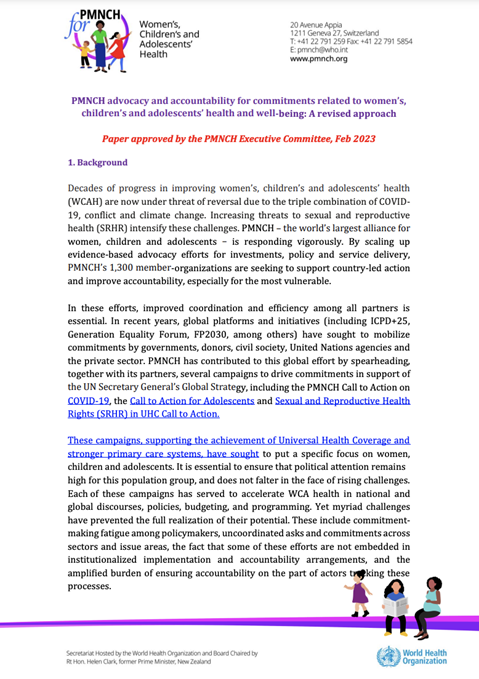PMNCH Advocacy and Accountability for Commitments related to Women’s, Children’s and Adolescents’ Health and Well-Being
A Revised Approach

Overview
Decades of progress in improving women’s, children’s and adolescents’ health (WCAH) are now under threat of reversal due to the triple combination of COVID-19, conflict and climate change. Increasing threats to sexual and reproductive health (SRHR) intensify these challenges. PMNCH – the world’s largest alliance for women, children and adolescents – is responding vigorously. By scaling up evidence-based advocacy efforts for investments, policy and service delivery, PMNCH’s 1,300 member-organizations are seeking to support country-led action and improve accountability, especially for the most vulnerable.
In these efforts, improved coordination and efficiency among all partners is essential. In recent years, global platforms and initiatives (including ICPD+25, Generation Equality Forum, FP2030, among others) have sought to mobilize commitments by governments, donors, civil society, United Nations agencies and the private sector. PMNCH has contributed to this global effort by spearheading, together with its partners, several campaigns to drive commitments in support of the UN Secretary General’s Global Strategy, including the PMNCH Call to Action on COVID-19, the Call to Action for Adolescents and Sexual and Reproductive Health Rights (SRHR) in UHC Call to Action.
These campaigns, supporting the achievement of Universal Health Coverage and stronger primary care systems, have sought to put a specific focus on women, children and adolescents. It is essential to ensure that political attention remains high for this population group, and does not falter in the face of rising challenges. Each of these campaigns has served to accelerate WCA health in national and global discourses, policies, budgeting, and programming. Yet myriad challenges have prevented the full realization of their potential. These include commitment-making fatigue among policymakers, uncoordinated asks and commitments across sectors and issue areas, the fact that some of these efforts are not embedded in institutionalized implementation and accountability arrangements, and the amplified burden of ensuring accountability on the part of actors tracking these processes.

.png?sfvrsn=6d0e27cd_1)



